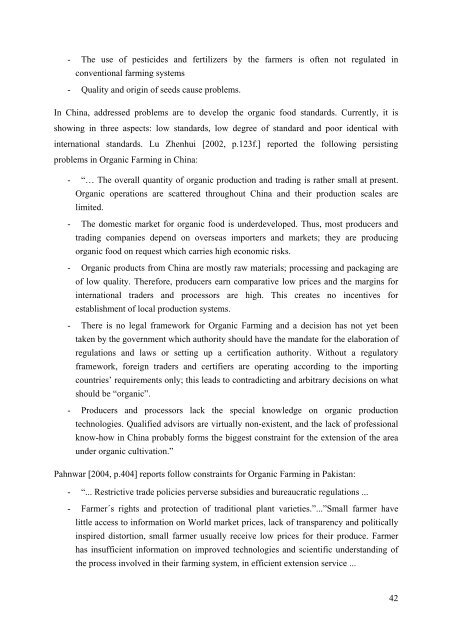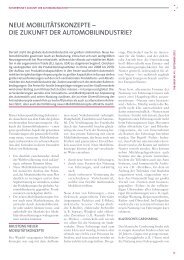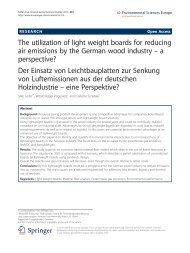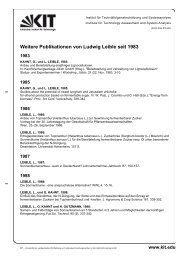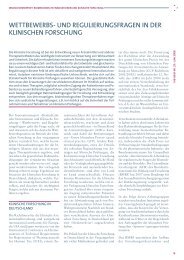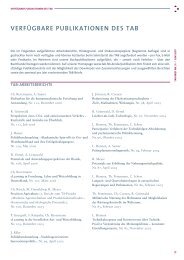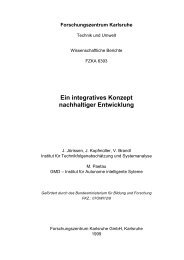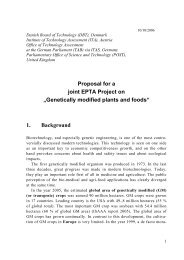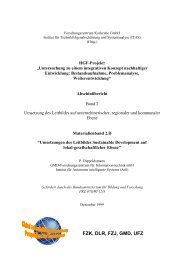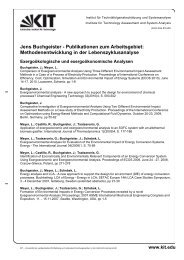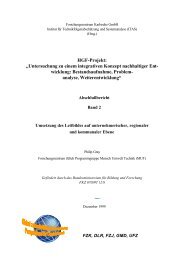Annex 4: Case study âOrganic Farmingâ - ITAS
Annex 4: Case study âOrganic Farmingâ - ITAS
Annex 4: Case study âOrganic Farmingâ - ITAS
You also want an ePaper? Increase the reach of your titles
YUMPU automatically turns print PDFs into web optimized ePapers that Google loves.
- The use of pesticides and fertilizers by the farmers is often not regulated in<br />
conventional farming systems<br />
- Quality and origin of seeds cause problems.<br />
In China, addressed problems are to develop the organic food standards. Currently, it is<br />
showing in three aspects: low standards, low degree of standard and poor identical with<br />
international standards. Lu Zhenhui [2002, p.123f.] reported the following persisting<br />
problems in Organic Farming in China:<br />
- “… The overall quantity of organic production and trading is rather small at present.<br />
Organic operations are scattered throughout China and their production scales are<br />
limited.<br />
- The domestic market for organic food is underdeveloped. Thus, most producers and<br />
trading companies depend on overseas importers and markets; they are producing<br />
organic food on request which carries high economic risks.<br />
- Organic products from China are mostly raw materials; processing and packaging are<br />
of low quality. Therefore, producers earn comparative low prices and the margins for<br />
international traders and processors are high. This creates no incentives for<br />
establishment of local production systems.<br />
- There is no legal framework for Organic Farming and a decision has not yet been<br />
taken by the government which authority should have the mandate for the elaboration of<br />
regulations and laws or setting up a certification authority. Without a regulatory<br />
framework, foreign traders and certifiers are operating according to the importing<br />
countries’ requirements only; this leads to contradicting and arbitrary decisions on what<br />
should be “organic”.<br />
- Producers and processors lack the special knowledge on organic production<br />
technologies. Qualified advisors are virtually non-existent, and the lack of professional<br />
know-how in China probably forms the biggest constraint for the extension of the area<br />
under organic cultivation.”<br />
Pahnwar [2004, p.404] reports follow constraints for Organic Farming in Pakistan:<br />
- “... Restrictive trade policies perverse subsidies and bureaucratic regulations ...<br />
- Farmer´s rights and protection of traditional plant varieties.”...”Small farmer have<br />
little access to information on World market prices, lack of transparency and politically<br />
inspired distortion, small farmer usually receive low prices for their produce. Farmer<br />
has insufficient information on improved technologies and scientific understanding of<br />
the process involved in their farming system, in efficient extension service ...<br />
42


